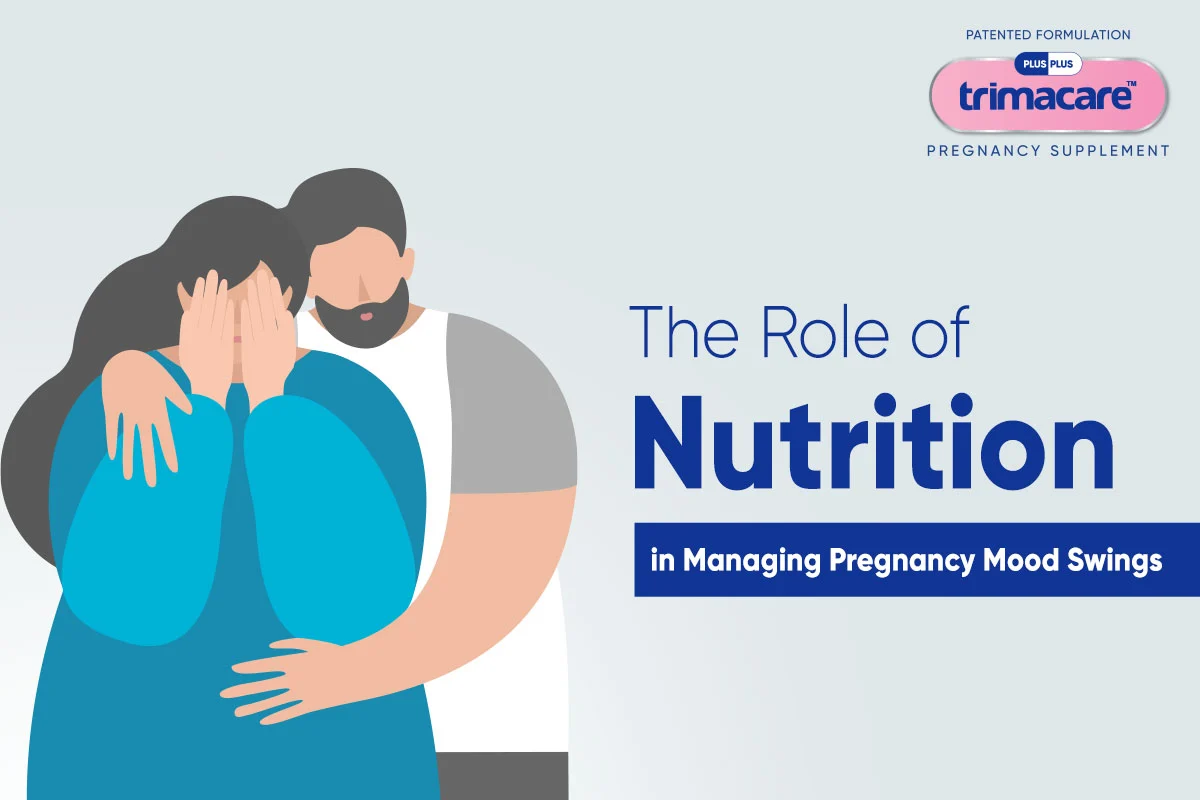WHAT IS MOOD SWING IN PREGNANCY?
Pregnancy is a transformative experience involving significant physical and emotional changes and understanding these changes can make the overall experience even better. The mood changes in pregnancy can be due to physical stresses, fatigue, metabolic changes, or hormones like oestrogen and progesterone. Pregnancy mood swings are an inevitable part of pregnancy. Hormonal fluctuations are a part of pregnancy mood swings, but nutrition plays a significant role in influencing the mood.
During the first trimester, mood swings are prevalent and recur in the third trimester as the body prepares for childbirth. Mood swings during pregnancy are brought about by hormonal changes, physical discomfort, and the anticipation of giving birth, which must be diagnosed by doctors to prevent the onset of hidden issues.
WHEN DOES MOOD SWINGS HAPPEN DURING PREGNANCY?
During pregnancy mood swings can occur at any time, but they mainly come during the first trimester and the third trimester.
First Trimester (Weeks 1-12): Mood swings, hormonal changes, emotional highs and lows, morning sickness and fatigue are common in early pregnancy because of the body’s adjustment to the growing foetus.
Second Trimester (Weeks 13-26): Women during the second semester, get relief from mood swings and their hormonal levels become stabilized, which causes their body to adjust to pregnancy, hence increasing emotional stability and energizing.
Third Trimester (Weeks 27-40): Pregnancy and mood swings may increase in the third trimester due to growing discomfort in the belly due to increased weight, and anxiety related to delivery.
WHY MOOD SWINGS HAPPEN DURING PREGNANCY?
Mood swings in pregnancy take place due to complex interplay of physical, hormonal, and emotional factors. Mood swings occur for several reasons during pregnancy:
Hormonal Changes: Pregnancy involves a change in the body concerning two hormones: oestrogen and progesterone. The fluctuation of hormones influences the brain which assists in controlling emotions and mood swings. Such an abrupt change may lead to pregnancy mood swings and emotional sensitiveness.
Physical Discomfort: Physical discomforts such as morning sickness, fatigue, back pain, and hormonal imbalances caused by pregnancy may also lead to mood swings and irritability. Also, these discomforts also affect sleep quality and intensify mood swings in pregnancy.
Stress and Anxiety: During pregnancy, women are full of anxiety and stress concerning giving birth, the baby’s health, lifestyle changes, and financial worries. Stress and anxiety can cause mood swings in pregnancy and make pregnant women more sensitive emotionally.
Emotional Adjustment: Pregnancy is a time of a lot of adjustment in life. Pregnant mothers may experience several emotions, ranging from excitement and fear to uncertainty about the future. Such changes in emotions lead to mood swings and difficulties in embracing parenthood.
Fatigue: Fatigue during the first and third trimesters during pregnancy can cause increased irritability and emotional instability. Insufficient sleep and rest can enhance pregnancy mood swings.
Body Image Concerns: Changes in body shape and size during pregnancy can impact self-esteem and body image. During pregnancy, discomfort with body changes can lead to mood swings and psychological stress.
Nutritional Imbalances: Poor nutrition or deficiencies like iron and vitamin B can affect mood. Adequate nutrition is required for emotional well-being. Nutritional imbalances will, therefore, increase both pregnancy and mood swings.
Personal and Relationship Factors: External factors such as relationship issues, lack of support, and pregnancy experiences can impact mood swings, but a strong support system and positive relationships can mitigate these effects.
PREGNANCY MOOD SWING SYMPTOMS
Pregnant women are prone to severe emotional ups and downs, ranging from elation and euphoria to depression, irritation, and anxiety. Mood swings may occur with no apparent provocation.
In pregnancy, a woman may be easily annoyed or irritated over trifling things.
- Emotional Roller coaster: Pregnant women are prone to severe emotional ups and downs, ranging from elation and euphoria to depression, irritation, and anxiety. Mood swings may occur with no apparent provocation.
- Irritability: Pregnant women might find themselves becoming easily annoyed, frustrated, or agitated over the smallest things.
- Increased Sensitivity: Pregnant women may become more emotionally sensitive, reacting strongly to situations or comments that wouldn’t have affected them as deeply before pregnancy.
- Tearfulness: Crying spells may occur more frequently, and pregnant women may find themselves tearing up over small or sentimental things.
- Anxiety: Anxiety and stress about the baby’s health, the delivery process, parenting, and other issues can arise throughout pregnancy. Mood swings during pregnancy are sometimes accompanied by excessive concern and apprehension.
- Difficulty Sleeping: Changes in hormones and physical discomfort can lead to insomnia or difficulty falling and staying asleep, which can contribute to pregnancy and mood swings.
- Changes in Self-Image: Pregnancy-related changes in body shape and size can affect self-esteem and body image. Negative feelings about these changes can lead to mood changes in pregnancy and feelings of insecurity.
- Sudden Food Cravings or Aversions: Hormonal changes can lead to unusual food cravings or aversions, which might also influence mood and emotions.
- Frequent Fatigue: This period often brings fatigue, which can exacerbate mood swings during pregnancy and make it challenging to cope with emotions.
- Difficulty Concentrating: Hormonal fluctuations can affect cognitive function, leading to difficulty concentrating or focusing on tasks, which might cause frustration and irritability.
IS MOOD SWING NORMAL DURING PREGNANCY?
Yes, mood changes in pregnancy are normal. The rollercoaster of emotions pregnant women experience is largely a result of the significant hormonal fluctuations that take place during this time.
The neurotransmitters of the brain are also affected by the hormones such as oestrogen and progesterone which are necessary to ensure a healthy pregnancy.
These emotional ups and downs can range from joy and excitement to anxiety, irritability, or sadness. Pregnancy’s physical and emotional adjustments, including fatigue, morning sickness, and parenthood anticipation, can intensify pregnancy mood swings. A supportive network helps navigate these mood swings during pregnancy, promoting a healthier pregnancy experience.
DO MOOD SWINGS AFFECT THE BABY DURING PREGNANCY?
Mood swings during pregnancy usually do not directly harm the baby. However, extreme, and prolonged stress or depression can affect the mother’s overall health and well-being of the baby indirectly. Stress hormones at high levels in the mother’s body may affect foetal development and be related to preterm birth or low birth weight. The stress and anxiety may increase the risk that the child may experience depression, ADHD, or other disorders.
WILL THERE BE MOOD SWINGS DURING EARLY PREGNANCY?
Indeed, pregnancy mood swings occur because of changes in hormone levels. Sudden leaps in oestrogen and progesterone may cause roller-coaster feelings.
Early pregnancy is usually characterized by increased sensitivity, irritability, or tearfulness in the pregnant woman. The excitement and apprehension that come with pregnancy are very natural.
HOW TO AVOID MOOD SWINGS DURING PREGNANCY?
To manage mood changes in pregnancy, prioritise self-care. Take adequate sleep, have a balanced diet rich in nutrients, and be involved in regular physical activity, such as prenatal yoga or walking. Taking emotional support from loved ones and professionals will help to manage mood changes.
PREGNANCY NUTRITION GUIDELINES
Pregnancy nutrition is important for the health and well-being of the pregnant mother and her developing baby.
A balanced diet includes fruits, vegetables, whole grains, and lean proteins, providing the essential nutrients that are vital for foetal growth and development.
The essential nutrient during pregnancy is folic acid. It helps prevent neural tube defects.
Many have been advised to take a folic acid supplement or consume foods rich in folates like Iron is essential for pregnant women’s blood volume, and the absorption of iron can be increased by combining iron-rich foods with vitamin C sources.
Calcium is essential for the development of a baby’s bones and teeth, and milk, cheese, and yoghurt are great sources. For lactose intolerant or vegan pregnant women, fortified plant-based milk alternatives and green leafy vegetables are recommended.
DHA is one of the important omega-3 fatty acids, which is important for the development of the baby’s brain and eyes, found in fatty fish like salmon, walnuts, and flaxseeds.
Pregnant women must keep themselves well hydrated, take less caffeine and should not consume alcohol to avoid dehydration, interference of foetal development, and harm to the foetus.
TRIMACARE’S BENEFITS: THE MOST PREFERRED PRENATAL VITAMINS IN INDIA FOR PREGNANCY
Pregnant women often struggle to obtain essential nutrients, especially during morning sickness. Well-balanced meals and taking prenatal multivitamins can help ensure a baby’s brain and organ development. Trimacare prenatal vitamin tablet includes 20+ nutrients including vitamins like Folate, Omega-3, Vitamin B6, Vitamin A, Vitamin B12, Iodine, Vitamin D, Iron, Vitamin C, Zinc, Vitamin K, Calcium, and Magnesium. It is the only prenatal pill required and can be taken by vegetarians. Trimacare is a vegetarian prenatal tablet; therefore, it should be used in case of sensitivity to the omega-3 fatty acids, DHA, or fish oil present in other multivitamins. Trimacare prenatal pill is a unique formula designed for pregnant women containing high absorption levels, plant-based ingredients, and no side effects for all three trimesters.
FAQs
- How do prenatal vitamins control pregnancy mood swings?
Yes, for the fact that they contain such basic nutrients as folic acid, iron, and omega-3 fatty acids; which have been associated with mood regulation improvement in pregnancy, can help in mitigating some swings in pregnant women.
- What specific nutrients in prenatal vitamins contribute to mood stabilization during pregnancy?
Folic acid, iron, vitamin D, omega-3 fatty acids, and B vitamins like B6 and B12 are some of the specific nutrients in prenatal vitamins that help stabilize mood during pregnancy.
- How should prenatal vitamins be taken to maximize their effectiveness in managing pregnancy mood swings?
Prenatal vitamins should be taken according to a doctor’s instructions, usually with a meal to help them absorb better. To get the most out of the vitamins’ ability to control mood swings during pregnancy, regular consumption is essential.
- How to take prenatal vitamins to manage pregnancy mood swings?
These prenatal vitamins are required to be taken according to a prescription from the doctor, usually with a meal to improve the absorption of these vitamins. To control mood swings during pregnancy efficiently with these vitamins, constant intake is required.
A Certified Nutritionist with a rich healthcare background in health journalism, the author has immense experience in curating reader-friendly, engaging, and informative healthcare blogs to empower readers to make informed pregnancy-related decisions.












